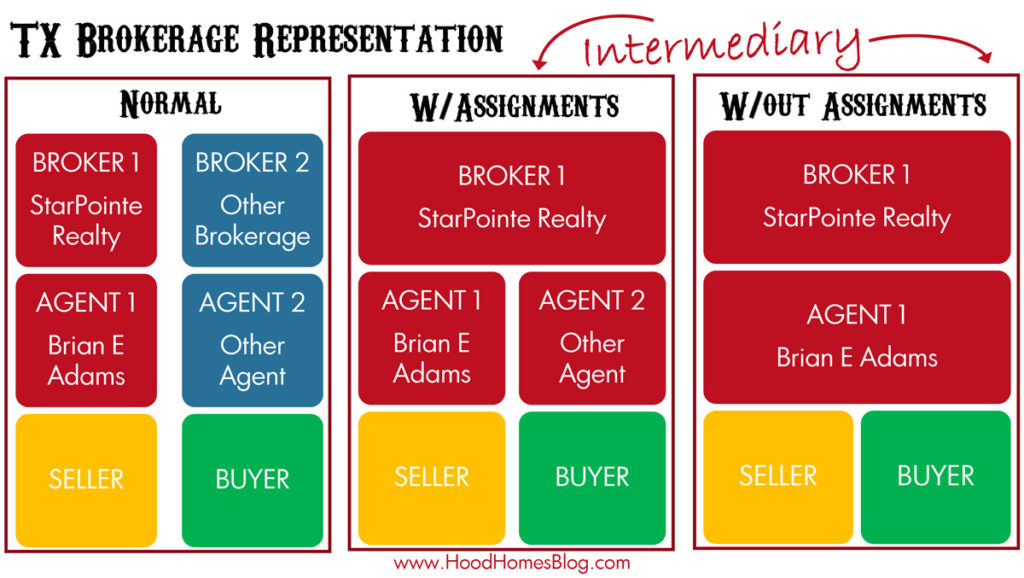Takeaways
- Be sure your agent represents you – otherwise, what is the point of an agent?
- Intermediary WITH assignments is probably just fine; intermediary WITHOUT assignments is probably a bad idea
- Any agent automatically represents the seller until you have a signed buyers representation agreement
The title to the post is a bit of a misnomer, because Texas does not have dual agency, but rather what is called “intermediary” – which is essentially the same thing as dual agency in other states.
What is an Intermediary?
An intermediary situation is when the same broker represents both parties. Note: not the same agent (which would also be intermediary), but the same broker. As we will discuss, often you may be in an intermediary situation even though you and the other buyer or seller have different agents.
When you first approach a real estate agent or broker, they are required to give you a copy of the Information About Brokerage Services, which explains the basics of agency and roles. This way you are informed and know what kind of representation – if any – your agent is obligated to give you.
“Normal” Transaction
Most real estate deals are not intermediary. In fact, for whatever reason, as of this writing I have yet to do an intermediary deal as a real estate agent, even though my brokerage is the 5th largest in the Fort Hood area.
Even the #1 listing agent in the Fort Hood area only has about 4% of the listings. That means only 1 out of every 25 of her buyers would be likely finding themselves interested in making an offer on her own listing. The vast majority of transaction in the Fort Hood area are between different brokers, and therefore not intermediary but “normal”. One broker/agent combo represent the seller, and a completely different broker/agent combo represent the buyer. Both sides get their own representation.
Intermediary with Assignments
The top brokerage in the Fort Hood area in 2016 had about 10% of the listings. So it might be very likely that their agents might expect to sell their brokerage’s listings about every 10th buyer.
This is technically an intermediary, even if the two agents are not the same.
“But they’re different agents – why is it an intermediary?”
Technically, your agent is not your representative – the broker is (my broker is StarPointe owner CJ Rogers). I as an agent essentially represent CJ, who represents you. So my colleagues are also technically representing CJ who are representing their buyers and sellers. When my buyer makes and offer on my colleagues’ listing, CJ is technically representing both parties. This has to be disclosed and agreed upon by both parties.
This situation is easily taken care of, because CJ “assigns” a different agent to the buyer and seller (my colleague and I to the buyer/seller we were already working with), who can do all the normal stuff that normal agents do.
In my opinion, there is generally no reason a buyer should shy away from Intermediary with Assignments. It will feel and look very much like any normal transaction.
Intermediary without Assignments
“Intermediary with Assignments” is easy for brokers with multiple agents. But what about broker/agents of one, who don’t have lots of agents working under a broker? They might be tempted to do an intermediary without assignments (since there is no one in their company to assign the buyer to). That is probably a bad idea, and they would be better off just referring the buyer to another agent in another brokerage.
Why is it bad? Because if I am representing both buyer and seller, I am not allowed to advise either party anymore. I cannot recommend an offer to my buyer. I cannot recommend a counter to my seller. I cannot recommend which repairs to ask for or anything. Intermediary without assignments essentially turns me into a glorified transaction manager, paper pusher. One of my most critical roles to buyers and sellers – as an advisor – is completely negated.
Further, there are a lot of fine lines to tread there, and it is very easy to accidentally disclose something I wasn’t supposed to, or to make one party feel like they are not being treated as well as the other. That can blow up into a lawsuit very quickly. No thank you to that.
Buyers
Just don’t use the listing agent . If your buyer agent happens to also be the listing agent for the home you fall in love with – request that either you or the seller be referred to another agent for the completion of the transaction.
I wrote an article about how I sometimes see deals on the MLS in which homes sold for far more than I thought they were worth. Oftentimes, I see that these were intermediary deals. These are difficult situations for both buyer and seller, though I find most often it is the buyer who pays the price (literally).
If I found myself in that situation (I never have), I would probably refer whoever I had been working with a shorter time – likely the buyer – to another agent in my office. It would then become an intermediary with assignments. That way, my buyer can still get an agent who can give them all the advice and help they need, uncompromisingly. It is common in these situations that, in my example, I would still get a referral fee for referring my buyer to someone else.
Why is “without assignments” even legal?
There are rare instances in which I can see doing an intermediary without assignments. Some brokerages might offer transaction assistance for a reduced fee, for example. In this case, maybe you are the seller and already have a buyer and have agreed on a price. You just want someone to help with the paperwork and transaction. You don’t need advice on a fair market value or how to negotiate.
In some rare cases like this, intermediary without assignments might be appropriate.
Sub-Agents: Why You Should Sign A Buyer’s
Representation Agreement
One last super important note: by default, a licensed real estate agent represents the seller and are called a sub-agent, until the buyer signs a buyer’s representation agreement.
That means if you meet up with some agent you found on Zillow, spend the weekend seeing homes, and then want to write up an offer, and haven’t signed the buyer’s representation agreement yet, technically that agent legally has been representing the sellers of all the homes you’ve been looking at the whole time.
While technically their fiduciary obligation is to the homeowners, in practice I would guess that most agents are not going to treat buyers much differently pre-buyers rep vs. post-buyers rep. Just keep in mind that when some agents ask you to sign the dotted line before you’ve even begun viewing homes, there is a reason that helps you!
I have definitely never been a sub agent or had experience with a sub agent. Many listing agents offer a reduced or even no commission to sub-agents. Listing agents often prefer that buyers have their own representation because sub-agents can possibly result in legal liability for the listing agent.
Conclusion
If you take nothing else from this article, just take this:
Don’t use the same agent that your buyer/seller is using.
And if it happens to be the same person you were using already, then ask to be referred to someone else. Your agent will still make some money from a referral fee, and you will still get the full privileges of representation that you deserve when buying or selling.
Brian E Adams, REALTOR®
I am a real estate agent in the Fort Hood area, with StarPointe Realty. Contact me for help buying and selling in Central Texas!



